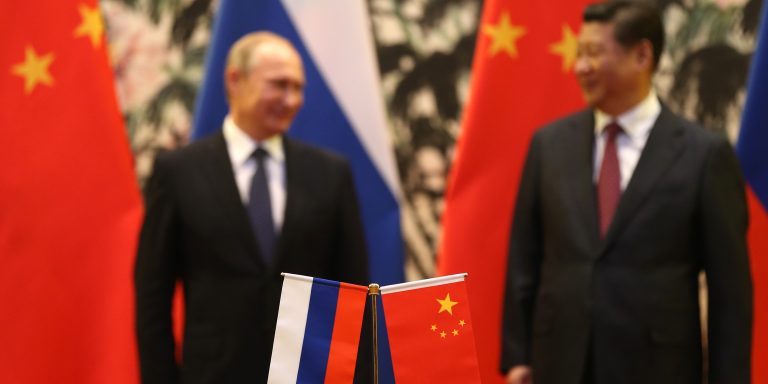IntelBrief: Chinese Disinformation Seeks to Support Russia’s Invasion of Ukraine
Intelbrief / IntelBrief: Chinese Disinformation Seeks to Support Russia’s Invasion of Ukraine
March 28, 2022

AP Photo/HOW HWEE YOUNG, pool
Bottom Line Up Front
- While China has provided humanitarian aid to Ukraine, both U.S. and European intelligence warned that Beijing has displayed openness to supplying Russia with both military and economic aid.
- Chinese state-backed media have amplified Russian conspiracy theories to spread disinformation about the war in Ukraine to a global audience, parroting the Kremlin’s talking points.
- China has seemingly also sought to amplify Russian narratives surrounding the prevalence of Neo-Nazis among Ukraine’s fighting forces, echoing Putin’s absurd claims of “de-Nazification” as a pretext for invading.
- Russia and China’s international influence operations to shape narratives on the war are aligned and at times, mutually reinforcing, making it clear that China is likely aligning with Russia in the information environment.
Since the beginning of Russia’s unprovoked invasion of Ukraine more than one month ago, the People’s Republic of China (PRC) has walked a tightrope, careful to avoid publicly choosing a side. In mid-March, however, reports surfaced that Russia had asked the PRC for military aid. While China has provided humanitarian aid to Ukraine, both U.S. and European intelligence warned that Beijing has displayed openness to supplying Russia with both military and economic aid. Both Russia and China have denied these reports. On March 18, President Biden warned Chairman Xi there would be “consequences,” including potential secondary sanctions, if China provides aid to Russia for the war in Ukraine. At a meeting just last week of NATO leaders, the alliance released a statement that called for “all states, including the People’s Republic of China… to abstain from supporting Russia’s war effort in any way, and to refrain from any action that helps Russia circumvent sanctions.” Nevertheless, China’s disinformation tactics at home and abroad reveal that Beijing is seemingly aligning with Moscow in the information warfare space.
The blatant efforts by the Chinese Communist Party (CCP) censorship and propaganda apparatus to silence anti-war voices and amplify Russian narratives on Ukraine within China have been well-documented by experts and journalists. For example, a leaked March 3 Cyberspace Administration of China (CAC) directive appears to instruct major Chinese social media platforms and online news portals how to regulate content related to the war in Ukraine. The PRC’s disinformation efforts on Ukraine also reach beyond China’s borders. Chinese state-backed media have amplified Russian conspiracy theories to spread disinformation about the war to a global audience, parroting false Russian narratives to assuage certain political objectives of the CCP. On March 8, a spokesperson of the PRC Foreign Ministry claimed that the U.S. was storing viruses in biolabs in Ukraine—echoing the statement made by the Russian foreign ministry spokeswoman Maria Zakharova (baseless claims that the White House has adamantly refuted). These claims were quickly picked up by known PRC-backed English language disinformation outlets like the Global Times. The false statement on biolabs is not only a recycling of China’s disinformation playbook during the COVID-19 pandemic, but also support for a likely Russian-backed disinformation campaign that has been amplified since the start of Russia’s invasion on February 24. The conspiracy theory about U.S. biolabs in Ukraine has been proven to resonate within fringe U.S. audiences, primarily because it plays on already existing disinformation narratives—chiefly, among QAnon adherents, anti-government extremists, and COVID-19 conspiracy theorists.
The PRC has seemingly also sought to amplify Russian narratives surrounding the prevalence of Neo-Nazis among Ukraine’s fighting forces, including unfounded claims the Ukrainian Azov Battalion is suspected of “involvement in a number of terrorist attacks and separatist incitement incidents in various countries and regions, including the riots in China’s Hong Kong Special Administrative Region in 2019.” Spurious claims also include that U.S. intelligence agencies cooperate with the Azov Battalion “to foster extremist forces in Eastern Europe against Russia.” Online artifacts have pushed conspiracy theories that Azov Battalion members traveled to Hong Kong and brought with them COVID-19 as a biological weapon planted by the United States. Several accounts propagating these false narratives have historically pushed pro-China propaganda, related to both Xinjiang and the origins of COVID-19. These disinformation narratives, similar to most that are effective, do contain a kernel of truth. The Azov Battalion has historically been criticized for extremism, and credible reports did place Ukrainian extremists on the ground in Hong Kong in 2019. But these incidents have been exaggerated and used to fit the CCP’s own political agenda while simultaneously piggy-backing on Russia’s “de-Nazification” disinformation narrative.
That China is attempting to benefit from an existing Russian disinformation campaign is not surprising. In the case of the war in Ukraine, it illustrates that Russia and China’s international influence operations to shape narratives on the war are aligned and at times, mutually reinforcing. It is evident that China is likely aligning with Russia in information environment, and the PRC’s disinformation tactics provide insight into the CCP’s true allegiances. This realization has important implications for U.S. national security and foreign policy, as well as the future strategic competition between the United States and the PRC. It is not unfathomable that China may justify its overt or covert military aid to Putin’s destructive war on Ukraine based on false narratives sown by the Kremlin, and amplified by the PRC, including those narratives touting the presence of “extremists” in Ukraine who have sought to undermine the PRC’s sovereignty and have been trained by the United States. Moreover, these narratives pushed by PRC government officials, state-backed media outlets, as well as likely disinformation networks online take an explicit anti-US and anti-NATO stance. Such disinformation narratives may be adopted and adapted to influence sentiments in the Indo-Pacific theater in the future in case of tensions between the United States and the PRC, for example over the status of Taiwan.


